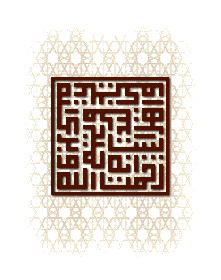 |
Muhammad, the Messenger of God |
|
| Muslims
believe that Islam completes the revelation of God’s final message to man through the
Prophet Muhammad Praise Be Unto Him (PBUH) and the Holy Qur’an. For Muslims, God
began His message with Judaism and Christianity, and Islam is the capstone of the
monotheistic tradition. The Prophet’s name means "the praised one" or
"he who is glorified" and traditionally every mention of the Prophet by name is
followed by one of several invocations. Usually it is sufficient to say ‘alayhis-salam’
or ‘Peace be upon him’ (PBUH). The Prophet is a descendant of the Prophets
Ibrahim (Abraham) and Ismail (Ishmael). His father was Abdullah, the son of Abdel Mutalib
and the grandson of Hashem who was the founder of the Hashemite clan. As the Prophet was born after his father’s death, and in keeping with pre-Islamic tribal law, he was unable to inherit from his father and was sent to be raised with a Bedouin foster mother, Halima al-Sa’diya, in the desert. The Prophet returned to Mecca under the care of his uncle Abu Talib, and as a young man, he earned a reputation for resolving inter-tribal differences. In fact, he was known within his Quraysh tribe as al-Sadeq al-Ameen, or ‘the honest, the trustworthy’. When he was twenty-five he married Khadija who bore the Prophet two sons that died in infancy, and four daughters. When the Prophet was forty years old, having already experienced visions, he received the first revelation of the Qur’an and the Divine message by the Angel Gabriel in a cave. His wife was the first to convert, followed by his young cousin ‘Ali, the son of Abu Talib, and Zeid his servant. The Prophet Muhammad (PBUH) first began to publicly preach to his own clan the Hashemites, and the first to convert from outside his family was Abu Bakr, his friend and influential merchant dealer. As the message spread and the followers of the new religion grew, so did the opposition in the city of Mecca. The city was at the time the center of trade and pilgrimage because of the Ka’aba, which held for the Meccans many sacred objects and idols of worship. With time, resistance to Islam became hostile and despite the ban placed on the Hashemite clan the Prophet remained uncompromising in his message of monotheism. To escape persecution many Muslims left Mecca, and eventually so too did the Prophet when it was realized that his life was in danger. With many of his followers already established in al-Medina al-Munawwara, the Prophet Muhammad (PBUH) emigrated under the cover of darkness in order to evade the search parties. This celebrated journey (622 CE) became known as the Hijra (emigration) and was later designated to mark the first year of the Muslim calendar, as the Prophet’s arrival in Medina marked the first Islamic state. Al-Medina al-Munawwara thereafter became known as the ‘city of the Prophet’. Over the next six years the Prophet lived in Medina, spreading the word of Islam and practicing its teachings. Soon, it became apparent that the Muslims would have to face the Meccans in the field of battle in order to further spread God’s message. In March 624 CE, against a superior force, the Muslims defeated the idol worshipping Meccans at the Battle of Badr, however only a year later the Muslims were defeated in the disastrous Battle of Uhud. In 628 CE the Prophet with 1000 men entered the walls of Mecca and soon afterwards the Prophet was acknowledged as the leader. Fully established in Mecca, the Messenger of God sent great expeditions to the north of Arabia, inviting others to enter into Islam. This marks the beginning of Islam’s expansion towards Syria and Persia. The ninth year of the Hijra (632 CE) is known as the "Year of Deputations" when delegates came from all over Arabia to enter into Islam. On June 8 of that year, the Prophet died and was buried in accordance to his wishes, in his house. The expansion of Islam continued extending from as far West as Spain to as far East as India within one hundred years. Today there are around a billion Muslims in the world. |
||